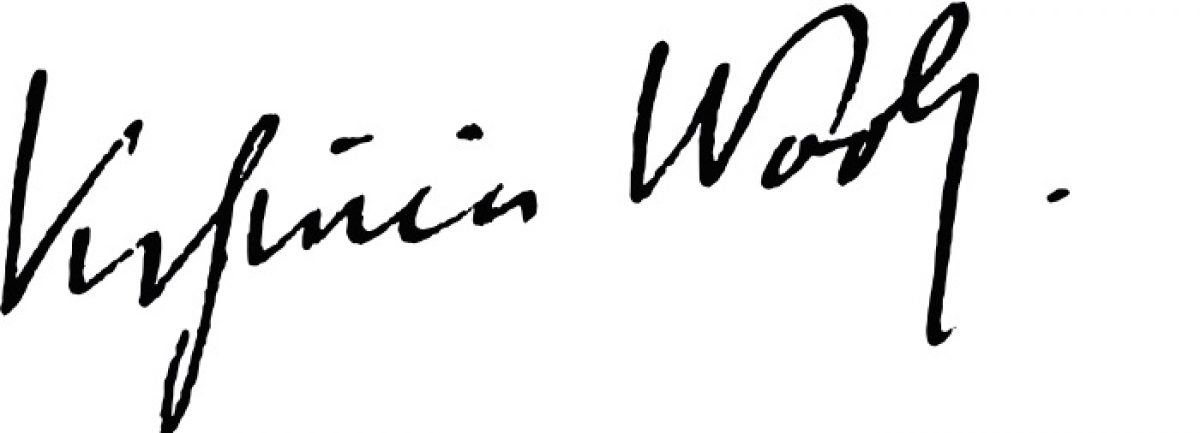Diary iii: 8 October 1917-3 January 1918
Hogarth House, Paradise Road, Richmond.
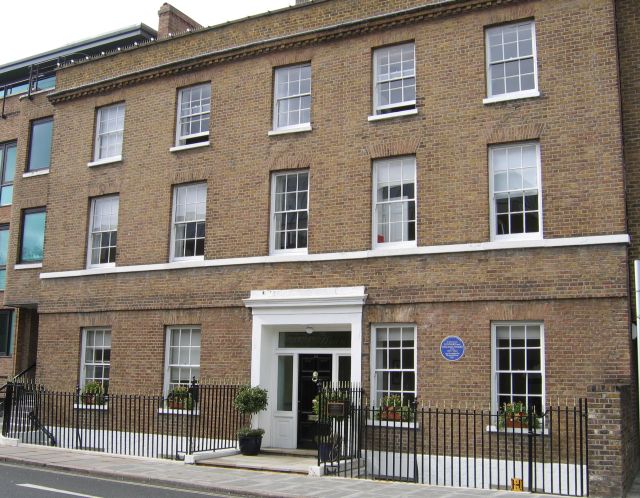
Monday 8 October: A new start inspired by a chance discovery of that very book that introduced the voice of Virginia in 1915, only to be silenced by her illness. Her enthusiasm is rekindled, to be, she says: “…written after tea, written indiscreetly…&…L. has promised to add his page when he has something to say…”. And this first day of her diary is, she says, “…the happiest day that exists for me…” – London, shopping for Leonard, paper & pens, the press… All is well it seems in Virginia’s world.
Busy, complicated days follow. The shock of Leonard being “called up” – and what to do! Preparing the manuscript of Katherine Mansfield’s short story “Prelude” for publication. On which, it should be said that the Thursday 11 October entry discusses Mansfield being a guest at dinner on the previous evening, and I read the passage such that this is a first meeting:
…wish was that one’s first impression of K.M. was not that she stinks like a – well civet cat […] taken to street walking […] shocked by her commonness at first sight; lines so hard & cheap. However […] she is so intelligent & inscrutable that she repays friendship…
Vol. 1 [p.58]
But that appears not to be so because Katherine Mansfield was a guest at Asheham from the 18 August until 22 August [pp.43-44] and an editorial footnote [p.43] says that Mansfield probably first met the Woolfs sometime towards the end of 1916. Hermione Lee on the other hand says they did not meet until February 1917. Perhaps every meeting with KM (or anyone else for that matter) was, for Virginia Woolf’s ever alert writer’s eye, a first impression perceived anew.
Sunday 11th November: Only here – for the first, and last (?) time – does Leonard contribute his tuppence worth – on the occasion of a particularly unsatisfactory luncheon with the Webbs:
…said that I would occasionally write […] here […] One of the worst Webb meals to which we have been […]Immediately after luncheon we fled […]Took a bus from Westminster […] very cold but refreshing after the discourse on committees.
Vol 1. [p74]
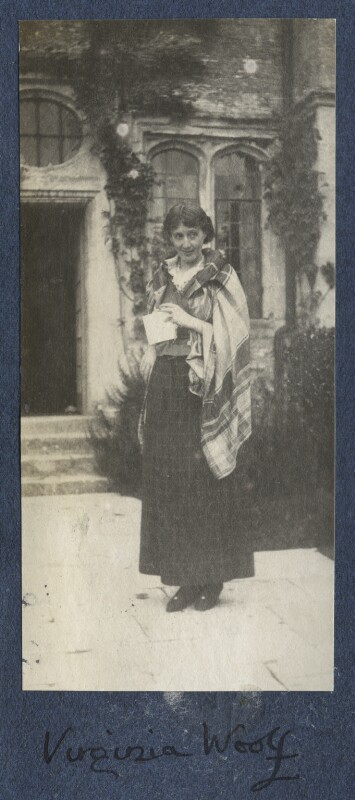
© National Portrait Gallery, London
Leonard bemoans the unhappy constellation of guests and incessant talk from Beatrice about the Reconstruction Committee and committees for this and that, and the unimpressive Tawneys and other (to his mind) vacuous talk, and they flee at the first chance. Virginia reports on the house full of guests when they got home – one of the more enduring friendships in Woolf’s life Ka Cox, and the Toynbees
It’s a shame really that a marriage diary like that of the Hawthornes did not develop – not just for us, the curious of posterity, but in the interests of the subjects themselves and their complicated union.
November days are aplenty with activity – the Women’s Guild, London, printing presses – bemoaning not receiving any letters and Sundays as boring, but the entries sparkle with wit and observation of the company she kept; exemplified in a chaotic weekend spent at Garsington. It is reasonable to wonder whether the adjacent snap was taken during this spirited sojourn. In terms of her diary, interesting is this remark on Thursday, 22nd November, a few days after their return:
I boasted […] about this book[…] filling it from a never exhausted fount at Garsington […] Ottoline keeps one by the way, devoted however to her “inner life”; which made me reflect that I haven’t an inner life.
Vol. 1 p.79
Doesn’t have an inner life! Indeed! (Footnote 28. [p79] references Morrell’s memoirs and confirmation of this exchange.) Was Woolf unaware of that which she was giving away of her self? Never explicitly – no impassioned soul-searching or bearing for her – but in the reflective mood, her mood, that hangs over just about everything she writes; giving enough to tantalise and want to come back for more.
Monday 3rd December – Monday 17th December: A tormenting few weeks these must have been. Sunday had brought the news of the death in battle of Leonard’s brother Cecil and the injury to his brother Philip (see also 4th Jan. 1915, footnote 16, p.7). Leonard visited his brother at Fishmonger’s Hall on London Bridge (just over 100 years later the scene of a terrorist attack) that had been converted to a military hospital on Wednesday. Air raids and sleepless nights followed, and spent with servants and cocoa. A long entry on 7th December is full of gossip about family, friends and foe. On 14th December Virginia accompanies Leonard to again see Philip, described by her as in a state of “absentmindedness” but recovering well enough.
An editorial note tells us that the Woolfs went to Asheham for Christmas on 20th December. The one entry she makes there she rewrites on her return to Richmond and is dated Thursday 3 January 1918. In it she recalls her calendar in the last days before leaving for Asheham as being full but revelry being intermittently interrupted by air raid warnings. The Christmas period was cold but fine, Virginia reads a lot and revels in the wintry landscapes, and it is very social with visits from Maynard Keynes and Clive Bell, a stay with Vanessa and Duncan and family and friends at Charleston where she is thrilled to report that her “…diary habit has come to life…”. I note that Leonard is peculiarly absent, until the very end …
“So we come to an end of the year, & any attempt to sum it up is beyond me […] news from Russia, which has just come in and drawn L. to remark ‘A very interesting state of things -‘ ‘And what is going to happen?’ ‘No human being can foretell that.’ ” The End [p95]
Diary IV: 4 January 2018-23 July 1918
Hogarth House, Paradise Road, Richmond.
The first days of January are spectacular for their ordinariness: “…breaking…my tortoiseshell spectacles” (p.99) – in far recent times a spurned accessory of necessity and in more recent times much in mode – and later to London to have them “seen to”, Hampton Court, “infernal” weather, burst water pipes, printing days and sedentary days – amongst other things, and in other words all the comings and goings of herself and others that constitute a Woolf life.
The “1917 Club” is of interest. Constituted on 19th December 1917 (see transcribed 3 January entry and footnote Vol. 1 p.94), the Woolfs’ first visit there on Friday 4 January 1918 is noted as a success, and as time goes on it becomes the place to meet up with their friends in London, referred to then as just ’17 Club’ and somewhere along the way as just ‘the club’. I have perhaps overlooked earlier mentions of how it came to be, and where exactly it is, but can think that “1917” relates to the year of revolution in Russia which certainly fits with the socio-political concerns (and sympathies) of Leonard. Internet research leads to rather meager results, but that at least seem to confirm Leonard as a founder and places it in Gerrard Street, Soho.
And while thinking Russian, he called always Kot, and whose name in full is Samuel Solomonovitch Koteliansky, comes to dinner on Friday, 18 January, and Virginia takes the opportunity to describe a “likeness to the Russians of literature” [p.108] which is surprising (or maybe not!) in that she then goes on to describe his apathy to Russia, his conviction that nothing good will come of revolution and that civil war is imminent. But his disparaging words on his friend Katherine Mansfield must have thrilled her no end:
…explained Katherine’s soul, not […] to her credit. Her lies & poses […] nor does he find more than a slight gift for writing in her. I don’t know that this last pleases me however, though it sounds as if I wrote it down for that reason…
Vol 1. p108
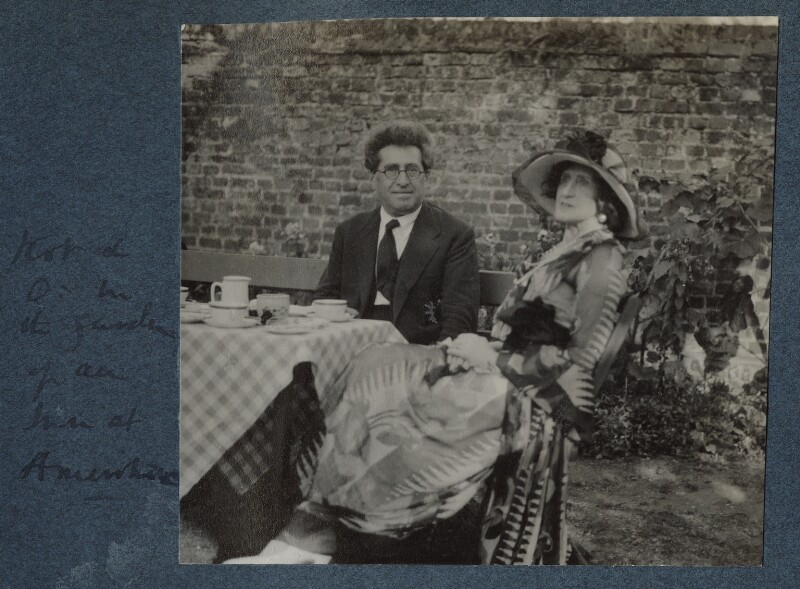
There again the K.M. problem! Given that Kot’s relationship with Mansfield seems to have predated Woolf’s own, one may wonder whether she has interpreted his impression of Mansfield to confirm her own complicated opinion of her. She somewhat intimates as much I think. (At JSTOR is a very interesting essay on Koteliansky’s role in the British modernist literary world and his work as translator – with amongst others VW & KM!)
Most of February is lost to tooth extractions, influenza and a retreat to Asheham and the countryside for the last week or so of the month; as explained in the entry of Saturday 2 March 1918 upon their return to Richmond.
Saturday 9 March 1918: To be noted is the Woolfs’ attendance at a ‘Suffrage Rally’ at the Kingsway Hall [Vol.1 p.125 footnote 15] which obviously informed those parts of Virginia’s 1919 second novel, Night and Day, that are set in a Suffragist office. Her remarks are indicative of her discomfort with, not just what she sees as their exhibitionist antics, but also the political agenda of the Suffragists. She bemoans the multitudes of one sex and the inability to accept and celebrate triumph with wit and eloquence (see Guardian citation – excerpt below). Who invited them to the event is not divulged – a Strachey perhaps.
Reform Bill Passed: Women’s Vote Won
The Representation of the People Bill, which doubles the electorate, giving the Parliamentary vote to about six million women and placing soldiers and sailors over 19 on the register (with a proxy vote for those on service abroad), simplifies the registration system, greatly reduces the cost of elections, and provides that they shall all take place on one day, and by a redistribution of seats tends to give a vote the same value everywhere passed both Houses yesterday and received the Royal assent…
The (Manchester) Guardian, From our Parliamentary Correspondent, Thu 7 Feb 1918 18.42 GMT
Friday 5 April 1918: The Woolf’s return to Richmond after having been at Asheham since 21 March. The visit of James Strachey with Noël Olivier unites for me two names almost synonymous with Woolf’s world. I will surely come back to the Stracheys, but while there was a biography only last year (Noble Savages: The Olivier Sisters by Sarah Watling, pub. Vintage) about the four sisters – Margery, Brynhild, Daphne, Noël – and they all turn up at various times in this diary; Bryn for instance was at tea at the Club on Tuesday 19 March [p129], they warrant more than a footnote. And most especially when Anne Olivier Bell is Brynhild’s daughter! Just another mesh in the intricate weave of Bloomsbury.
Virginia’s entry of Monday 8 April [pp 134-135] is a delight. A chance meeting with Roger Fry in the Charing Cross Road – such were the times I suppose when one of the world’s great metropolises was at heart just a big town – “…a whirlwind …blown straight into a bookshop…” to buy an obscure French novel (Et Cie by Jean-Richard Bloch – “a Jew” she says) & then to tea at the club & Goldsworthy Lowes Dickinson. Then to Poland St. to pick up her watch that was being repaired – but alas she did not have enough money to take it with her “…owing to the seductive magic of Roger…”! I hope she at least enjoyed the French novel!
Leonard makes his presence felt at the beginning of the merry month of May. On Wednesday 1 May he writes a paragraph on dining at the Webbs – where there is much talk of peace as well as war and the idea of a League of Nations. And a few days later, it is his turn to have a tooth out. It is on this day, Monday 6 May, that a visit to the club finds “…James [Strachey I presume] reading the Antigone”. [I see what Virginia Woolf surely saw: Edward Pargiter in The Years immersed in “Antigone” at Oxford and fantasising about his cousin Kitty.]
Tuesday 28 May 1918: A long entry relates the previous days, since May 17, spent at Asheham, and the days preceding that at Hogarth which included the newly married (to John Middleton Murray) Katherine Mansfield coming to lunch on 9 May looking “…marmoreal…ghastly ill” [p.150] and Clive “…babbled & prattles & hinted at all his friends & parties & interests…” [p.151]. Asheham was in heightened Spring fever – the weather, the flowers, fishes, frogs, the birds – she doesn’t mention the bees. There was a picnic with Roger and a night spent at Charleston. “May in England is all they say – so teeming, amorous, & creative…” [p.151] she says, and whether she speaks of nature or man or both?
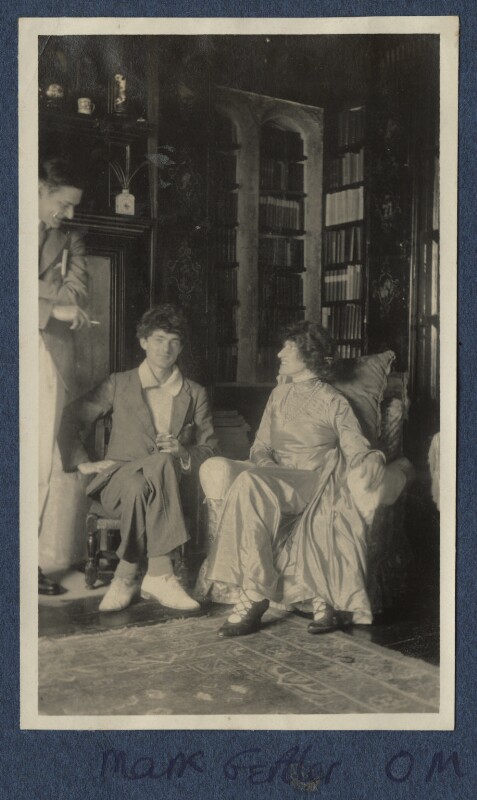
June 1918: Gaps in Woolf’s diary are accounted for firstly, by the weather – days for enjoying the outdoors not curled up inside reading and writing – then by the interruptions of a steady stream of visitors; Virginia seems astounded at their popularity (false modesty perhaps!). And then there are these League of Nations Society meetings to which she accompanies Leonard, and infighting and intrigues galore. On June 24 Kot and Mark Gertler dine with the Woolfs and Virginia restates her approval of the former and shares a less than flattering monogram of Gertler (“…well worth talking to…” she says, but “not to be trusted” and “probably unscrupulous”). In both appraisals, and again not to be overlooked, their Jewishness seems almost irrationally important to her – I mean, why mention it, Virginia? There’s news out of Charleston (Vanessa is pregnant), the continued setting of Mansfield’s Prelude, servants, and always the Club.
Then on Friday 5 July “…L. printed off the last of Prelude “ and on Tuesday 9 July “…The title page […] done on Sunday […] folding & stapling […] ready for glueing & sending out tomorrow & Thursday…” [p.164]. And then on Wednesday 10 July:
We have sent off our first copies this evening, after spending the afternoon in glueing & covering. They surprised us when done by their professional look – the stiff blue cover pleases us particularly. I must read the book through after dinner, partly to find possible faults, but also to make up my mind how much I like it as literature.
Vol. 1 p.165
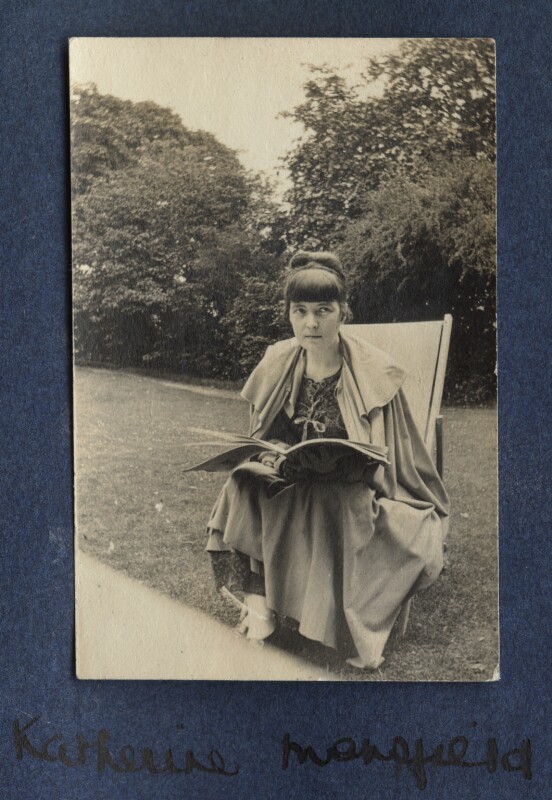
by Lady Ottoline Morrell, print, 1916-1917
NPG Ax140568 © National Portrait Gallery, London
To be clearly heard here the echoes of Virginia Woolf’s sheer pride in the results of her joint venture with Leonard, and their craftsmanship on display (here it is at The British Library in all its “stiff blue cover” glory), her impatience to read the finished product, the wanting to find faults. And with what? With their own handwork? Or, with whom? Katherine Mansfield? And then there is her continued uncertainty about KM – her person and her literary merit. It’s as if Woolf is excited by, but also resents, their shared labours, aware that she has been gifted a peculiar pleasure by this complicated, ailing young woman. But her literary appraisal is generous enough, on Friday 12 July she notes “…I myself find a kind of beauty about the story; a little vapourish I admit, & freely watered with some of her cheap realities; but it has the living power, the detached existence of a work of art.” [p.167]
Also on this day, the Woolfs met Lytton Strachey at the Club for tea, with much of the conversation to do with his newly published book Eminent Victorians which was a roaring success and had generally been critically acclaimed, though not so by the, also eminent, Mrs. Humphry Ward. Many a non-fiction fare from this period has long been forgotten, not so this one – an epochal work of biography that moved beyond a prosaic reeling off of truths and half-truths and damned lies all in the interest of the subject’s good name, but rather a work unto itself, a new art form saying as much about Strachey as about the four subjects. May I suggest this article in The Guardian 100 years after the publication of Eminent Victorians.
Tuesday 23 July: Woolf looks back a few days, and the Saturday 20 July visit with Lytton and Carrington at Tidmarsh, the former is “…very amusing, charming, benignant …” and Carrington “…is silent, a little subdued […] kisses him & waits on him & gets good advice & some sort of protection.” This, another relationship amongst her intimates that perturbs Woolf greatly, and her observance of Carrington’s dependency upon Strachey would prove, in time, to be tragically prophetic. Carrington often irritated her, but did she also recognise a familiar trait that would always make life a struggle?
This is the last entry of Diary IV, and the next written in the same form starts just a few days later.
